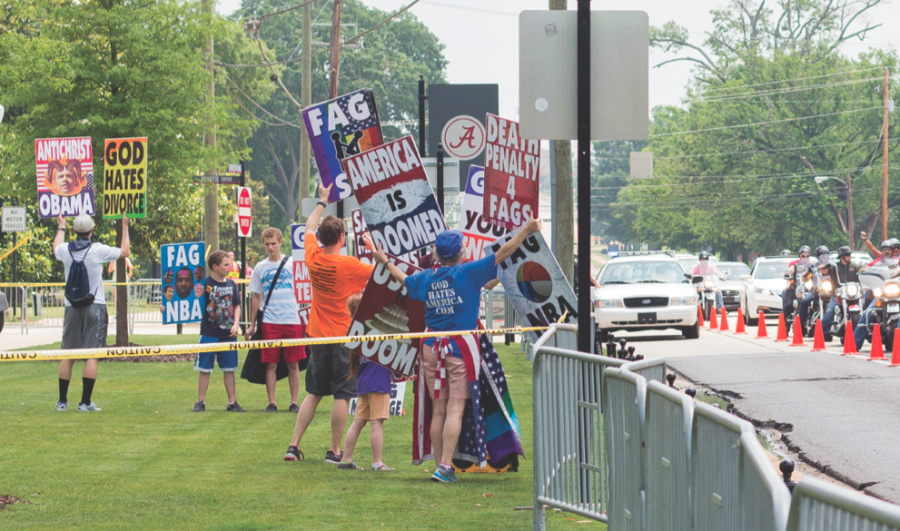When Westboro Baptist Church members arrived in Tuscaloosa Saturday, May 18, the picketers came prepared with a message spouting hate and biblical warning.
The church’s message, denouncing The University of Alabama, said it is one of many American colleges that has become a “hotbed” of sin. And it is part of the so-called Bible Belt that, they believe, is just as bad.
“Bibles are everywhere. People don’t read them,” Shirley Phelps-Roper, a member of the church, said. “Stop lying about it being a Bible Belt. Those cities are just like everywhere else. It’s like an unwashed mass of the same thing everywhere. Everywhere. Corner to corner.”
WBC had come to a school in the heart of the perceived Bible Belt and was met with mixed reactions but often ones of love, forgiveness and even just quiet disregard.
Regardless, WBC was met by a changing Bible Belt. And whether or not it would have agreed with the old one, the Bible Belt it came to denounce is one already under construction.
According to a January 2013 study by the American Bible Society, Alabama still has three cities in the top-10 “Bible-minded” cities list, with Birmingham/Anniston/Tuscaloosa ranked No. 4. The study ranked cities on Bible-mindedness based on residents’ Bible reading habits and beliefs.
But the study also pointed out that what was previously the traditional Bible Belt is changing. Previously stereotypical Bible Belt cities such as Houston, Texas, San Antonio, Texas, and Tulsa, Okla., have fallen off the list, and the belt has become less a region and more a series of hot spots.
Geoffrey Morin, chief communications officer for the American Bible Society, said the study helps their organization look at cities, not only comparatively, but also individually. A study like this helps the society track the “Bible landscape” of the U.S., one that is apparently morphing.
He said the southeastern cities still dominate the top of the Bible-minded list, and northeastern cities tend to rank lower, but the list is now more specific.
“The traditional Bible Belt is now probably more accurately descried as Bible polka dots, “dominated by Southeast metros, but spotty,” Morin said.
John Giggie, associate professor of American and Southern history at the University, said the “Bible Belt” metaphor was never completely accurate.
“What it failed to capture was not the diversity of the kinds of religion in the South but the differences among Southern Christians,” Giggie said. “I think as a catch-all phrase, it’s waning in accuracy and utility.”
Giggie and Morin both said unwavering faith in the Bible is a consistently defining characteristic of Southern Bible Belt/ Bible minded cities.
What’s changing, Giggie said, is the openness of Southern religion.
“Fifty years ago, African-Americans were seen by white Christians as not being able to be worshipped with,” Giggie said. “Now, interracial fellowships are growing quite rapidly in Pentecostal churches.”
Giggie also said the presence of women in higher roles was evidence of change.
“They’re rising in power in lay ministries,” he said. “As missionaries, as mission directors, they’re in charge of youth groups – that’s different.”
What has always distinguished religion in the South, Giggie said, was the ease with which people discussed their faith. “It’s not uncommon to hear people talk about it in a coffee shop or at a party or just in the street. In the South, it just rolled off people’s tongues,” Giggie said.
He said that and the fact most people belonged to a Christian denomination was the makeup of the previous Bible Belt. Now, he said, the South is much more “cosmopolitan” in its makeup of religions.
The new face of the Bible Belt includes new Christian denominations, a blending of Christian denominations as well as openness to non-Christian, non-traditional beliefs. What will always remain are the groups that lean on the side of the extreme.
“There are always groups that are on the extreme side of polite society,” Giggie said. “That is, those who are willing to try to manipulate the media or people’s emotions to broadcast a message.”
Giggie said WBC is part of a longer tradition of extremism in America that 50 years ago was more racially based.
“But that’s faded away recently,” he said. “Much in the same way, I think Westboro will eventually fade away because their message of hatred and extremism and intolerance is not garnering an audience of supporters, only detractors.”









